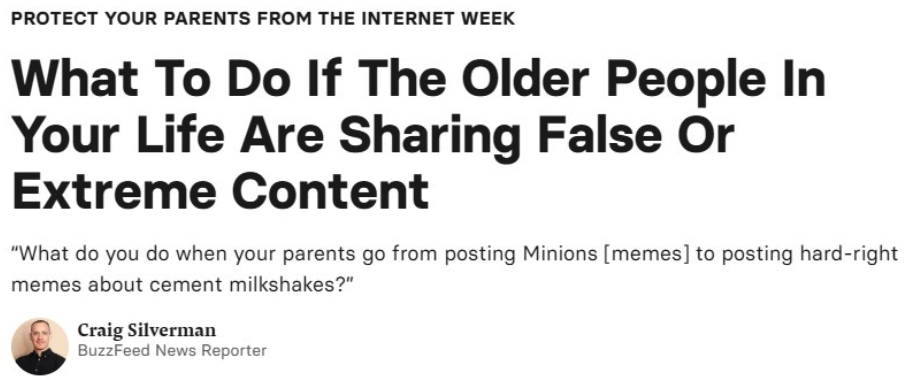If you are a woke Millennial, chances are at least some of your older relatives – parents, grandparents, uncles – are not just an embarrassment but a menace, using their limited internet skills to spread lies and alt-right propaganda, even if often without realising that they are being literally Nazis. But fear not. BuzzFeed News’ media editor Craig Silverman is here to help:

Be it personal photos or false or inflammatory articles and memes, young people find themselves struggling to manage, and at times confront, the extremely online adults in their lives.
Boomers and older generations are by no means the only people having trouble in our new and chaotic information environment, although research suggests they have the most pressing challenges. Younger people also face difficulty, which is why so many news literacy programs target K-12 and college students. But the rapid pace of change on online platforms — and the lack of widespread reach of programs like Cyber Seniors — have left some older adults struggling to catch up.
The challenge is to handle the situation in a way that works and doesn’t fray intergenerational relationships, according to Mike Caulfield, director of blended and networked learning at Washington State University Vancouver. He also runs the Digital Polarization Initiative, which pioneers new approaches to teaching information literacy. Caulfield said his students see the need for older people in their lives to learn the skills he’s teaching.
“Students in every class said, ‘This is great, [now] what are you going to do about the adults?’ It’s one of the consistent things that come up. And it’s not half jokingly; I feel like it’s very sincere,” he said. “I do feel when they bring this up, they have very specific people in mind.”
Those oldies, what would they know. Hence, Buzzfeed’s useful advice on how to help your parents stop embarrassing you:
Supply the Missing Context
Caulfield said it’s common for older people to unwittingly share things that have extremist messages or iconography. “It’s very hard to see people posting stuff that may come from a kind of a dark place that they don’t realize is dark,” Caulfield said. “What do you do when your parents go from posting Minions [memes] to posting hard-right memes about cement milkshakes?”
He says it’s important to intervene privately and help the person understand the larger — and more concerning — context.
“There’s a good chance your family member doesn’t understand that and might be horrified at what they’re sharing. And so there’s a point to intervene and let people know, ‘Hey, I know, this was probably not what you meant, but…’”
Keep It Positive and Personal
Experts agree that being non-confrontational is key. Daniel Kent founded Net Literacy, a nonprofit, in 2003 when he was in middle school in Indiana. One of its first programs was Senior Connects, which helps older people get online and gain basic internet skills.
“I think it’s fundamentally about treating [older people] with concern and respect. Recognizing that … perhaps they had the best of intentions, but the execution on their part perhaps wasn’t the most, the most thoughtful and mindful,” he said.
Don’t Be Afraid to Go Public
While engaging privately is often best, there are cases where you may want to intervene publicly. For example, if an acquaintance is sharing false or misleading information that’s generating lots of engagement.
Get Them to Google (News) It
When someone in your life seems to share information that’s unmoored from reality, try to understand what emotion, opinion, or idea the person is trying to express — and shift them toward a better place to get that information…
Caulfield suggests encouraging the person to search for the central topic or claim on Google News, which exercises control over which websites are included in its database. This helps locate a story from a more credible source that still acknowledges their point of view or emotion…
Look in the Mirror
Be self-aware enough to realize you may also not have the best information-consumption habits, either. Practice finding other sources for a story and compare details to learn to spot inconsistencies between coverage. Then share the good stuff. You can also choose to do that instead of intervening with friends and family.
Wow. That gives me a new sitcom idea: “Are You Being Patronised?” After all, Dad, you old fool, you don’t know your ass from your elbow, but we will assume for the moment – until proven otherwise, which is a distinct possibility – that you are merely stupid and not actually malicious.
There, there, read something reputable like CNN or the New York Times and you’ll see how foolish you’ve been, putting others at risk of misinformation and reflecting badly on your enlightened children.
Not that the parents need any advice on how to deal with their children, but here’s a possible response I’m working up.
Reader, I give some key lines “What To Do If The Younger People In Your Life Are Giving You Shit About Your Social Media”:
I know your advanced degree in Gender Studies is very important, but get back to me when you’ve had some life experience. In anything.
I’ve only lived a few decades, had an education, built a career, paid taxes, raised a family, seen the world, but really, what would I know?
Just because you’re offended it doesn’t mean you’re right.
Yes, when I wrote that socialism doesn’t work I really meant it.
Sure, son, Google is the absolutely impartial and impeccably honest arbiter of the truth out there. There, there.
My house, my rules; you don’t like what I put on my Facebook, get out of my basement.
I’ll have fries with that.
They’re a good start, no?
Arthur Chrenkoff blogs at The Daily Chrenk, where this piece also appears.
Got something to add? Join the discussion and comment below.
Got something to add? Join the discussion and comment below.
Get 10 issues for just $10
Subscribe to The Spectator Australia today for the next 10 magazine issues, plus full online access, for just $10.


























Comments
Don't miss out
Join the conversation with other Spectator Australia readers. Subscribe to leave a comment.
SUBSCRIBEAlready a subscriber? Log in